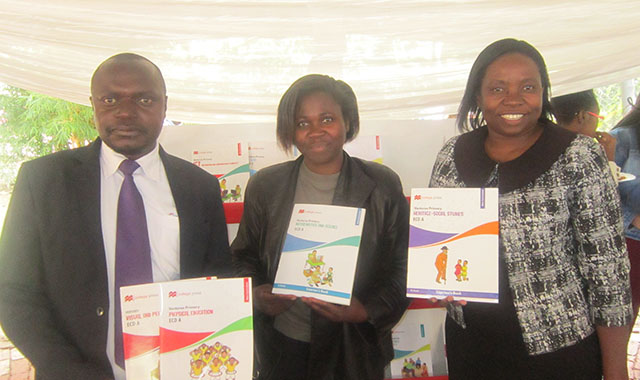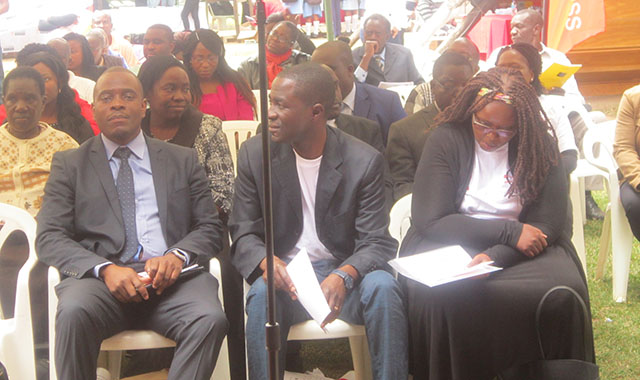College Press answers new curriculum call

Elliot Ziwira @ The Book Store
Although no single definition may be said to be holistic in the explanation of the complex phenomenon known as curriculum, it can be simply referred to as a course of study or plan for what is to be taught in an educational institution (Wiles, Bondi in “Curriculum Development: A Guide to Practice”, 1998).
According to Gatawa in the book “The Politics of the School Curriculum: An Introduction” (1990), the curriculum is general in nature, for it encompasses all societal speculations about knowledge and what constitutes it. Knowledge should have a basis as determined by society.
The body of knowledge that a society draws from should be imparted on the individual in such a way that he/she will be able to use the same knowledge to evoke his own untapped inherent knowledge so that he/she not only improves himself/herself, but the society that shapes him/her.
Because it is generally tailored towards some definite direction or purpose where goals considered by society to be appropriate are achieved, the curriculum can therefore be said to mirror both the social and political aspects of society. The curriculum has purposes, aims or objectives which reflect general societal aspirations.
Society plays a significant role in determining what is considered worthwhile knowledge, desirable attitudes and relevant skills. However, because knowledge is dynamic as it constantly changes with the coming on board of new truths in the ever changing universe, policymakers should always be privy to any shift in expectation, so that what is considered as knowledge remains relevant to societal needs.
As posited by Gatawa (1990) and Wiles, Bondi (1998) citing the educator Pestalozi (1746-1827), the curriculum is not all about shaping an individual to be an intellectual, but he or she should be able to use his/her head, heart and hands, as such it should embrace cognitive, affective and psychomotor objectives.
For the interrelatedness of the phenomena curriculum, syllabi, courses and lessons to be explored in depth, it is imperative that curriculum objectives are laid bare. Cognitive objectives, which refer to intellectual tasks such as remembering, recalling and classifying should be emphasised.
These objectives are essential in that they shape the individual to be more than a philosopher, but one who is able to offer solutions to problems that affect society; be they educational, commercial, industrial, social or otherwise. The tendency to develop individuals, who cannot think beyond bookish learning, is as tragic as it is illogical.
In Zimbabwe it is the Government through its policymakers that determines the design of the curriculum to be used in schools and other State-controlled institutions of higher learning.
Thus, the designing of the curriculum has political connotations as it tends to follow political traits. This is especially so because the colonial structure of education tended to be biased against the black majority. It is such bias which puts the curriculum in constant motion as there is need to perpetually monitor it.
However, though much has been done since Independence, the colonial hangover seems to linger on in our education system, which somehow impedes development. There should be a shift from developing employees to sharpening potential employers, who can create opportunities for themselves in today’s global village.
It is against this backdrop that Primary and Secondary Education Minister Dr Lazarus Dokora should be applauded for spearheading the shift from an employee-based slate to one that allows for individual development of talent, because examinations in their nature do not determine one’s intelligence per se, so condemning an individual for life because of mere failure to respond to set questions is as callous as it is criminal.
There is more to life than bookish learning, and it is this that took the Bookstore’s fancy when College Press Publishers launched educational books on the New Curriculum, which was implemented by the Ministry of Primary and Secondary Education in January 2017, at the ZIBF in the Harare Gardens on August 4, 2017.
The colourful event was graced by Ministry of Primary and Secondary Education (CDTS) officials, authors, headmasters, teachers, booksellers, fellow publishers, pupils and parents.

Front row (from left) College Press Publishers managing editor Phillip Mudzimba, operations director Charles Geti and managing director Natsai Gurupira
A whopping 61 books were launched from ECD A, through Grade One, to Grade Three and Form One, with a learner’s book, workbook and teacher’s book in the subjects; Mathematics and Science, English, Shona, Ndebele, Heritage Social Studies, Visual and Performing Arts, Information and Communications Technology, Physical Education, Mass Displays (ECD A).
For Grade One and Grade Three, the books launched are for learners and teachers in the ventures series in English, Shona, Heritage Social Studies, Mathematics and Science as well as Indonsakusa.
New subjects have been introduced starting from Grade One to keep abreast with the changing tides on the global landscape, and hone individual talent across learning spheres. Introduced at Grade Three are Science and Technology, Family, Religious and Moral Education and Agriculture; and these are covered in the Ventures primary series.
Also launched on the historic day were Form One leaners’ books in the Focus series on English, Mathematics, Commerce, Combined Science, Agriculture, Family and Religious Studies, History and Geography. “Nhapitapi YeChishona and “Ihawu Labafundi/Labafundi” were also part of the avalanche of books on offer.
Speaking at the launch, College Press Publishers managing editor Phillip Mudzimba said that the journey to the printing press leading to the launch, was not an easy one, as they had to plan and implement a publishing process that took over 12 months.
“From a publishing perspective it was a process of selecting the right authors, training and guiding them to ensure a smooth writing process. The majority of our authors, some of whom are here to grace this occasion, managed to meet their deadlines without incident.
“However, a few of them had to be pushed, given the limited time available and the complexity of the learning areas they were writing on. At the end of it all, they all managed to deliver quality manuscripts and we thank them for that,” he said.
Mudzimba also reiterated the need to grab opportunities as they come, as was the case with the updated curriculum, which had seen their organisation opting to publish in over 30 learning areas at both primary and secondary levels.
It is this zeal to take “the bull by its horns”, which made it possible for them to publish 64 books in record time, 61 of which were launched, with more still to come off the press, he intimated.
Beaming with excitement, Natsai Gurupira, College Press Publishers managing director, said that as they prepare to celebrate their milestone 50 years in the publishing industry next year, they take pride in having grown with teachers and learners in creating high standards of education in the country.
She said that their commitment and contribution to the success of the New Curriculum was spurred on by a desire to drastically contribute “to the growth and development of many” and “add value to humanity”.
Indeed, without books humanity is doomed, and with books that add no value to our being, as well as foist no aspirations, we are equally doomed, hence College Press Publishers’ answer to the New Curriculum call is not only commendable but inspiring, for it creates new outlets for creativity and at the same time accords us an opportunity to be ourselves, even though all else around us may be changing.
As a way of taking the book to its intended target – the pupil – College Press Publishers is offering free sample copies of every New Curriculum textbook available to every bookshop and school in its database. These sample copies have been distributed throughout the country through the publishers’ sales representatives, so that bookshops and schools will be in a position to show parents the books, thus making it easier for them to buy them for their children.
College Press Publishers also allayed fears that Islam will be the dominant religion in schools, as some quarters have been saying. Although a lot has been said about Islam coming in to dominate, all religions will be catered for in the New Curriculum.
However, even though the whole syllabi is Christian based, other religions like African religion, Christianity, Islam and Judaism have been dealt with evenly under one unit, in a bid to make learners know of them in detail. The emphasis in the New Curriculum is to give the learner a chance to make an informed decision on which religion to follow, instead of choosing for him or her
It is our hope at the Bookstore, however, that the books will find their way on our shelves, and subsequently in our schools, where the beneficiaries of this noble cause await them with eager hands, instead of them remaining out of reach; in a case of the heart willing, the eye desiring and the pocket yawning, which benefits the piracy apparatus that we so much dread, yet seem to tolerate.









Comments